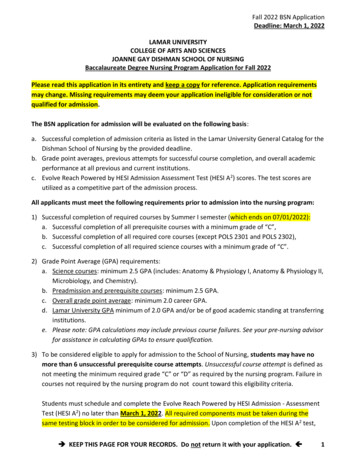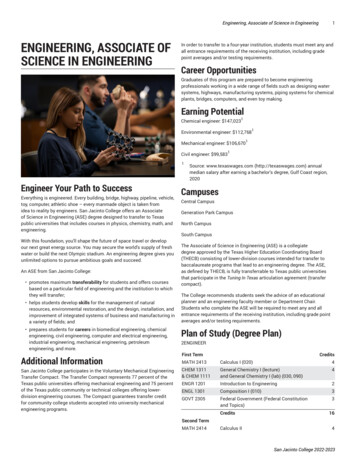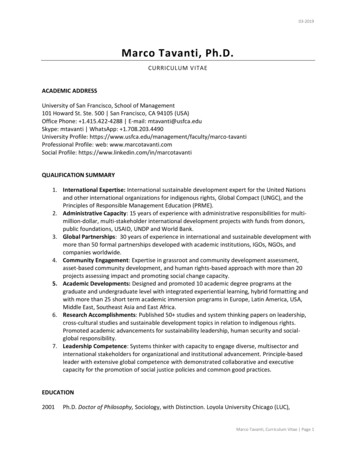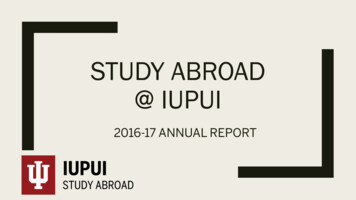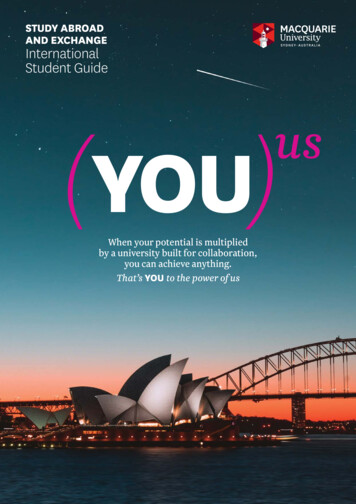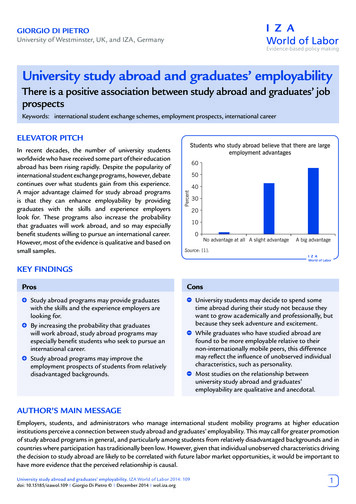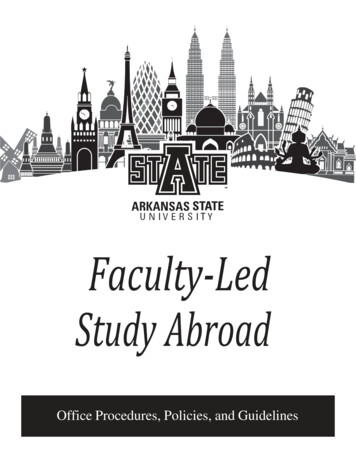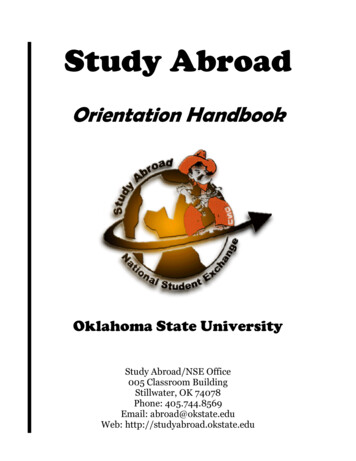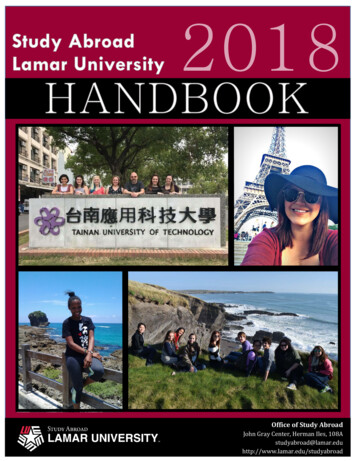
Transcription
Study Abroad Handbook 2016Office of Study AbroadJohn Gray Center, Herman Iles, dyabroad
Study Abroad Handbook 2018Iceland – Molly RossCongratulations on your decision to study abroad!You will soon embark on what might be the most challenging, exciting, and rewarding experienceof your life. The Office of Study Abroad at Lamar University is excited to get you ready for yourjourney. Of course, studying abroad is academically rewarding and a great way to boost yourresume, but it also gives you the opportunity to learn about a new culture and challenge yourselfin new ways. Don’t be afraid of the unfamiliar!This handbook contains information that will help you prepare to make the most of your studyabroad experience. If you are looking for specific information, use the Table of Contents to directyou. For further information on study abroad, come to the Office of Study Abroad and we will behappy to help. The Office of Study Abroad 2
Study Abroad Handbook 2018Table of ContentsOffice of Study Abroad Contact Information . 4Before you go AbroadI’ve Decided to Study Abroad, Now What? . 5Passports & Visas . 5Credit Transfer . 6Who Can Study Abroad? . 6Are International Students Allowed to Study Abroad? . . . . 6Financing your Study Abroad Experience 7Pre-Departure Orientation . 7Air Travel and Arrangements 8What to Pack . . 9While you are AbroadCultural Adjustment, Culture Shock, & Stereotypes . . 10Make the Most of It . 12Housing and Homestays . . 13Money Matters . 14Traveling While Abroad . 16Contacting Home . . 16Health and Safety While Abroad . 17When you come HomeStay Involved – Getting the Most out of your Experience . . 21Study Abroad Photo & Video Contest . . 21Readjustment & Reverse Culture Shock . 22More InformationFAQ . 22Traveler’s Checklist . 24Country Profiles . . 25Emergency Contact Information . 303
Study Abroad Handbook 2018Office of Study Abroad Contact InformationFeel free to come by, email, or call us. We will be happy to answer any questions or talk toyou (and your family!) about any concerns you may have.Office of Study Abroad: John Gray Center, Herman Iles Building, 108AWebsite: http://www.lamar.edu/studyabroadActing Assistant Directorof Study AbroadBrittney Crossley409-880-7013bcrossley@lamar.eduFrance – Taylor Blount4
Study Abroad Handbook 2018I’ve Decided to Study Abroad, Now What?Here’s a checklist of what you’ll need to do first:1.2.3.4.Choose a programFill out an Application Form onlinePay your depositApply for a passportPassports and VisasDo you have a passport?If you do not, then you’ll need to apply for one. This processcan take around 6-8 weeks, so it is recommended that you applyonce you have decided to study abroad.If you do have a passport, but it is going to expire within 6 monthsof the end date of your travels, you will need to renew it. Mostcountries require your passport to not expire within 6 months of yourtravel to that country.Everyone who travels is required to have a passport, whether you are going to Mexico, China, oranywhere else. For more passport information check out travel.state.gov.What is a visa and do I need one?Visas are given as a sign of permission for a person to enter a country and are generated by thehost country. There are different types of visas depending on what your purpose is for going toanother country: tourism, study, or work. Visas also depend on how long you will be in thecountry. Usually, you are required to get a visa in advance, not at the airport upon arrival.However, most countries do not require a visa for U.S. citizens going on short-term studyabroad.If you are travelling on a Lamar University short-term faculty-led program, and a visa is requiredfor your host country, we will help you get your visa. However, if you are going for a semesteror on a non-LU program, you will have to get a visa on your own, but we will help you get theinformation you need to apply for one. In this case, you are responsible for applying for andobtaining your own visa.Credit Transfer5
Study Abroad Handbook 2018Will my credits transfer back?If you are going abroad on a LU short-term faculty-led program, the credits on the program havealready been approved and you will register and receive those credits as if you were a taking aclass on campus. If you are going abroad on a semester exchange or on a non-LU program, youwill need to fill out a credit transfer approval form, which can be obtained from the Office ofStudy Abroad.Who can Study Abroad?All full-time LU students in good academic standing with at least a 2.0 GPA are able to study abroad.Students from other universities are also able to attend LU faculty-led programs, but must enroll atLU for the term in which they are to go abroad. Family members and spouses are not allowed toparticipate on the program with you unless they register for the class(es).Costa Rica – Kay-Alana TurnerAre International Students Allowed to Study Abroad?Yes! You are allowed to study abroad, however where you can go depends on your U.S. visa type,which country you are from, and where you want to travel to. It is possible that you will not need anadditional visa to enter your host country. ALL international students will need to acquire travelauthorization on their I-20/DS-2019 prior to exiting the United States.For more information on studying abroad as an international student, please speak with the Office ofStudy Abroad.6
Study Abroad Handbook 2018Financing Your Study Abroad ExperienceLamar University ScholarshipsCosta Rica – Kay-Alana TurnerLU is proud to offer several funding opportunities specifically to study abroad students.Study Abroad Fee Grant: Available to all LU students who pay the 2/semester study abroadfee and have been accepted on an approved study abroad program.Carter Innovation Fund/Steinhagen Fellowship: Funding is available through the College ofBusiness for business majors studying abroad.McMaster Grant (Honors College): Honors students can apply for additional fundingthrough the Honors CollegeOther Study Abroad ScholarshipsThere are many scholarships you can apply for depending on where you are going, what you willbe studying, and how long you will be abroad. For a complete list of scholarships see ourScholarship Information page on our website.Some of the most well-known scholarships are the Gilman, Boren, and Fulbright. If you areinterested in applying for any of these three, please come and talk to the Office of Study Abroadfor information specific to each of these scholarships.Also, if you receive any other scholarships from Lamar University, talk to the Scholarship Officeto find out if/what will apply to study abroad (Ex: Some scholarships may cover your semesteror summer tuition costs).FundraisingStudents are strongly encouraged to fundraise on their own or with their fellow study abroadparticipants. Many students choose to start GoFundMe’s or sell baked goods or small items. TheOffice of Study Abroad recommends students interested in fundraising to speak to their programfaculty and organize a group effort to fundraise.Pre-Departure OrientationAll students going on a LU study abroad program are required toattend the pre-departure orientation. This orientation will provideyou with important information regarding studying abroad. Thisincludes: financial matters/banking, what to pack, safety measures,information about international medical insurance, and much more.Orientations will take place on specified dates before you travel.Students will be notified of when and where the orientation will takeplace via the email address provided on your application. If yourcontact information has changed since the time of your application,please inform the Office of Study Abroad.London – Lindsay Orand7
Study Abroad Handbook 2018Air Travel and ArrangementsMany of our short-term faculty-led programs include airfare in the program. For these programs, theOffice of Study Abroad will handle all flight arrangements for the students. However, if you are goingon a semester exchange or on a program that does not have airfare included in the program fee, youwill have to arrange your own international airfare. Here are some things to remember when bookingyour own international flight: Know which airport you should be arriving at. If you are meeting a representative orgroup for your program, you need to know where you will be meeting them once youland. Some big cities have more than one airport in the vicinity. Know what day you have to arrive on. Some international flights arrive a day later thanwhen you leave and some arrive on the same day. It depends on which direction you aregoing and how far you are traveling. Know your baggage allowance. You will have to check with the airline you are using inorder to know how many checked or carry-on bags you are allowed, as well as theirweight and dimensions. Give yourself enough time to make your connections. If you have a connection/layover,remember to give yourself at least an hour to make your connecting flight. Especiallywhen flying internationally it is important to give yourself time to go through customsand immigration – think 2 hours to make your connection. There are often long lineswhen arriving in a country because multiple international flights arrive around the sametime every day. Keep your passport/visa with you at all times during travel. Everyone is required to passthrough customs and immigration when entering a foreign country and again upon arrivalback into the U.S. Don’t pack your valuables in your checked luggage. You should never pack importantthings in your checked luggage. Your phone, money, laptop, camera, prescriptionmedications, and any other important items should always go with you in your carryon.Spain – Brittney CrossleyNote: If a group flight is included in your program, but you prefer to book your flight separately, this may be possiblein certain situations. You will need to put your intent to fly separately in writing to the Director of Study Abroad atleast 4 months prior to departure and submit an itinerary for your travel plans after you receive permission to book.8
Study Abroad Handbook 2018What to PackYou’ll need to pack sensibly and light, especially if you will be moving around and not staying in onelocation while you are abroad. Carrying around a heavy suitcase as you take buses or trains is neverfun. Don’t take too much stuff, you will want room for souvenirs. Airlines have specific weight restrictions and size limitations on all baggage. You’ll have tocheck with your airline to find out the specifics. If you take prescription medications, make sure you bring enough for the duration of yourprogram. Keep the medication in its original packaging and carry the prescription or a letterfrom your doctor explaining your condition and medication. Remember to bring yourmedication with you in your carry-on in case your check luggage is lost or delayed. If you wear contact lenses or glasses, bring an extra pair as well as your eye prescription incase they are lost or broken. If you are bringing an electronic device, remember that the electrical currents and plugs in aforeign country may be different than at home. Check before traveling and if it is different,get a converter/adapter. A converter is used to change the electrical current and an adapterchanges the plug. Make sure not to pack your money, camera, laptop, tablet, or other important items in yourchecked bag. You should always bring a spare set of clothing in your carry-on. Sometimes luggage maynot arrive on time or gets lost in transit. Having a spare set of clothing in your carry-on is agood way to make sure you will be prepared upon arrival Valuables should be left at home.Your program faculty will be able to provide you with a sample packing list for your program. You canalso find a general recommended packing list at the end of the handbook. Remember to check theweather before you depart so that you bring appropriate clothing with you.9
Study Abroad Handbook 2018Cultural Adjustment, Culture Shock, & StereotypesWhat is culture?Culture is a difficult concept to understand. It can be broadlySouthdescribedas the beliefs, values,Korea – Brittney Crossleyideas, and customs of a society. As a study abroad student, you will have the opportunity toexplore a new culture or cultures by meeting and interacting with people from your host country.Why is cultural adjustment important?Adjusting to a new culture and country can often be very difficult and stressful. By finding waysto adjust and understand your host culture, you will be able to make the most of your experienceabroad.Whether it is your first time abroad or your hundredth, you will have to be aware of the fact thatevery country is different and has its own unique culture. What is normal for you in your homecountry may be strange and unusual in your host country and vice versa. Try not to focus on thebad things or challenges you face. Instead, try to find the humor in embarrassing situations (thosemake the best stories) or try to find a way to overcome those challenges. You also need to beaware that you might be put in situations you are not used to and must understand that this is apart of living and studying in a different country.Avoid being judgmental and consider that there is more than one way to accomplish things. Tryto be understanding of your host country and take this experience as an opportunity to find newways of looking at the world, as well as a chance to try something new.What is culture shock? Will it really happen to me?Culture shock is something that can happen to anyone, regardless of whether they have beenabroad many times or if this is their first time. You might experience a variety of differentemotions and recognizing it will help you cope.Some symptoms of culture shock include: Loneliness or sadness Anger, irritability, resentment, depression, or feeling vulnerable Lack of confidence Developing stereotypes about the new culture Longing for family Identifying with your home culture or idealizing your home country Loss of identity Insomnia, desire to sleep too much or too little Unable to solve simple problemsIt is normal to feel this way and many people experience a roller coaster of emotions whilestudying, traveling, working, and living abroad. If you need someone to talk to, your facultyleading the program, as well as the Office of Study Abroad, are here to help you.10
Study Abroad Handbook 2018Japan – Marcus RodgersHow can I prepare myself for culture shock/adjustment?It’s important to learn about your host country before you go. There are several ways of doingthis: Read books, articles, and blogs about your host country Watch movies or tv shows about or made in your host country (these give you a betteridea of culture and many can be found with English subtitles online if your host country’snative language is not English) Consult travel books, blogs, or podcasts Try to meet with international students from your host country on campus Find out if you can contact returned study abroad students to find out what theirexperiences were like in your host countryYou should also consider how locals view time, the roles of family and gender in society, privacyand personal space, elders, alcohol, and personal relationships. These are all aspects of cultureand different countries have different views on these things. In some cultures it is acceptable tobe late and in others it is expected that everyone should arrive early.What is a cultural stereotype?Stereotyping is a strong tendency to characterize people of other cultures unfairly, collectively,and often negatively. This uniformed generalization is applied to every individual in a culturalgroup (‘All British are reserved’ or ‘All Americans are materialistic’), or used to generalize basedon experience with only a few people from the group (‘All British are reserved like MargaretThatcher’ or ‘All Americans must be materialistic like Beyonce’).Stereotypes are often based on race, religion, ethnic origin, nationality, gender, socio-economicstatus, or affiliation. Stereotypes are often employed by a dominant group to denigrate orstigmatize less powerful groups, stereotyping substitutes ‘a prejudiced attitude’ for ‘an objectiveanalysis’.11
Study Abroad Handbook 2018How are Americans perceived abroad?While you need to be cautious not to stereotype cultural values of others, you may also facestereotyping of your cultural values as a U.S. American. You also need to be aware that you mayexperience anti-American sentiment during your trip abroad. It is important not to be naïve aboutthe conditions you may encounter. You should be careful not to confuse critique, opinion, or factwith knee-jerk disdain for your country. Most people are not anti-American and you should notexperience any obvious threats to you because you are American. Nevertheless, you mayencounter individuals who are politically opposed to our government or military activity.Remember that if you encounter someone who has a stereotype about Americans that you do notagree with, you have the opportunity to represent not only Lamar University, but also yourcountry. Also recognize that having a different opinion does not make you or another personwrong. Sharing your ideas and opinions are great ways to gain an understanding of the way othersperceive your country – just take caution not to mistake critique of your government for apersonal attack on yourself.Make the Most of ItThis is a once in a lifetime opportunity. There are a few ways to make sure you get the most out ofthis experience and create amazing memories:Prepare. Where are you going and what will you be doing? What is going on in the country youare visiting? Any major news? By learning as much as you can before you go, you will prepareyourself to experience the country you will be staying in. Buy a travel book or read a blog. Notonly do they give you a perspective of what it is like to be in that country, but they will also giveyou insight into places you may wish to visit or great restaurants in the area.Explore. Take the time to learn about the city/cities you are staying in. If you can, participate inlocal cultural events. Explore museums, find a favorite restaurant, attend a festival or parade, tryon traditional clothing or eat some traditional food. Make sure you explore and experience whatyour host country has to offer.Connect. One of the best things you can get out of your experience is making friends. Whetheryou become friends with your fellow study abroad participants or the locals, often times these12
Study Abroad Handbook 2018friendships last a lifetime. Go out of your comfort zone and try going to places that are notprimarily American or expat hangouts. You will meet and connect with many amazing anddifferent people.Communicate. If you are studying abroad to learn a language or know a bit of the local language,this is the best way to practice and learn new things. While you will often find people speakEnglish overseas, do not expect everyone to know English. If you are going to a country wherethe primary language is not English, try to learn a few words, such as ‘hello’, ‘thank you’, ‘whereis the bathroom?’, or ‘how much is this?’. Not only will people be surprised you have taken thetime to learn some of their language, they are likely to be more friendly and welcoming becausethis shows you are interested in their country and culture.Capture. Try to take as many pictures or videos as you can. Maybe you like to journal or blog.You will want to remember as much as you can when you get home so you can tell your friendsand family about your experience. The time you spend abroad is full of memories and stories thatyou will remember and look back on for the rest of your life.Ireland – Sarah SchwartzHousing and HomestaysWhile studying abroad, there are several different types of housing students will have. Depending onyour program you will either be in a hotel, dormitory, or home stay.Hotel/hostel. Students going on short-term faculty-led programs that are traveling to severaldifferent places in their host country will most likely be staying in a hotel or hostel. Thesearrangements are made by the Office of Study Abroad. Some programs offer students the optionof paying more for a single occupancy room rather than sharing with other students. You will needto contact the Office of Study Abroad for more information.Dormitory. For students studying abroad for a semester or on some longer programs that are in asingle city, their housing is likely to be dormitory style. Semester exchange and some short-termprogram students will have the chance to live on campus at a university overseas. This is a greatway to meet other students from your host country. Semester exchange students will have to confer13
Study Abroad Handbook 2018with their host institution in regards to dormitory arrangements. Short-term program students willhave their housing arranged for by the Office of Study Abroad.Homestay. A great way to immerse yourself in a culture is to have a homestay. If your program isproviding you with a homestay housing arrangement you will get the chance to live with a localfamily in your host country. You should remember that you are a guest in their home and shouldbe respectful of your host family’s property and lifestyle. In some cultures it is nice to give a giftto your homestay as a means to thank them for letting you stay with them. Some common giftideas are t-shirts, magnets, or small knick-knacks. Avoid giving gifts with a religious or politicalaffiliation.Money MattersHow much money should I take?It depends on your personal spending habits and what expenditures you expect in your host country.You need to determine which meals are covered by the program and which are not. Anotherconsideration is the cost of living in your host country, is it cheaper or more expensive. Also decidehow much you want to spend on souvenirs.How do I exchange money?If you plan on exchanging money (see below about using an ATM instead), it is recommended toexchange money before you go abroad. You can do this at your local bank. Call before you go tomake sure they have your host country currency available. While you will be able to exchangemoney at the airport or a bank in country, it may be harder once you arrive to find a place toexchange your money. Always keep in mind the current exchange rate so you get a fair deal withconverting your USD into the local currency.14
Study Abroad Handbook 2018Cardholder Tips for TravelersDebit and credit card fraud can cause major problems for you as a consumer if you are travelingabroad. Here are some tips to prevent becoming a victim of fraud:1.2.3.4.5.6.7.Contact your bank/credit union before traveling abroadAsk your bank/credit union about potential fraud block in other countriesTest your cards before leavingAlways bring an alternative payment method. Never bring just one debit or credit cardMake sure you hide your debit/credit cards, cash, or travelers checks in different placesBe aware of Pick PocketsHave contact information for your bank/credit union and your credit card companies inthe event your card(s) are lost or stolenTraveling is an enjoyable experience but precautions should be taken to protect your accounts.How do I access money while abroad, and keep my money safe?While abroad, use the same precautions you would while in any large city in the United States. Beaware of the potential for pickpocketing. Many ATM/debit cards can be used outside the U.S. atATMs and you will be able to withdraw the cash in the host country’s currency. However, becareful when using an ATM. Avoid using ATMs on the street and try to use one inside of a bank.Also consider carrying a money pouch inside of your clothing. Avoid putting your wallet or moneyin a place that is easily accessible.Make sure you notify your bank that you will be traveling internationally and where you will begoing. This way your card will not be frozen and you will be able to make withdrawals abroad.What if I run out of money?Remember to manage your finances while abroad and keep to your budget. In the event that youdo need money transferred to you, consider the following: ATM: If you have an ATM card, a family member can transfer funds to you and you canwithdraw them abroad. Western Union or MoneyGram: these are immediate cash transfer stations used to transfermoney around the world. Depending on the amount of money sent, a small service fee ischarged.South Korea – Linda Pham15
Study Abroad Handbook 2018Traveling While AbroadIf you are spending a semester abroad, you may decide to travel within or outside of your host country.These costs fall on the student and it is up to the student to make arrangements. You will be requiredto notify the Office of Study Abroad of any out of host country travel.You can opt to travel by air, train, or bus and you will have to find the respective information for eachof these modes of transportation in the location of where you will be traveling to. Some things to keepin mind are different currencies, visa regulations, and safety. Avoid places where your safety might bein question. Here are some helpful resources.Kayak: www.kayak.comStudent Universe: www.studentuniverse.comRyanair: www.ryanair.comEurail: www.eurail.comSTA Travel: www.statravel.comU.S. Department of State: travel. state.govContacting HomeWhether you are going for a week or a year, you will want to contact family and friends to let themknow you have arrived safely and to check in. Here are some ways to get in touch with those still in theU.S.: Skype. Allows for free computer-to-computer calling; also offers regular long-distance ratesstarting at about 0.02/minute. You can also use Skype’s webcam communication andchat/instant messenger. Pre-paid calling cards. Fairly economical and easy to purchase,especially in Europe. You can buy a card for any number ofdenominations, with a correlating number of minutes available. Cellphone. Depending on how long you will be abroad, you may beinterested in getting a prepaid cell or setting up your current phone(some cellphones do not work in different countries due to thefrequency used). You can also talk to your local phone provider inthe U.S. Some text-only plans are very affordable and give you easyaccess to your friends and family back home. Check outhttp://roadpost.com for some information on international cellphoneplans. Host family phone. If you live with a host family, they may onlyallow you to use their phone with an international calling card or theymay ask you not to use it for international calls at all. You shoulddiscuss it with them before making any phone calls. Free Apps. There are a variety of free applications you can downloadonto your phone or tablet to use overseas such as What’s App andKakaotalk. Wi-fi is often available for your use while abroad.16
Study Abroad Handbook 2018Health & Safety While AbroadGeneral SafetyIt is important to apply the same common sense whiletraveling overseas as you would at home. Enroll in the Smart Traveler Enrollment Program Create and carry a list of emergency phone numberswith you at all times Pay attention to warnings and follow the directivesissued by program administrators regarding safetyand security issues Stay updated and informed on current news andevents around the world Keep copies of your passport or other forms ofidentification on you Avoid poorly lit places and walking alone. Stick toChina – Andrew Ramirezwell-traveled streets and walk in a group at night Do not leave your bags or personal belongingsunattended Be aware that dating norms and gender roles may be different in your host culture Have sufficient funds and/or a credit card on hand for emergencies Avoid political demonstrations, large crowds and gatherings Be aware of your surroundings Act responsibly. Avoid substance abuse and use alcohol sparingly (it increases yourvulnerability to crime)Medications and InoculationsBefore you go Try to take care of any foreseeable medical, dental, gynecological, or optical needs. You shouldtake an adequate supply of any prescription medications you may need with you and be sure totransport the medication in the original containers. If you are being treated for any pre-existingmedical problems and/or have to carry a large supply of medication, be sure to have a letterfrom your doctor describing your medical condition and any prescribed medications, includingtheir generic name and that the medication is for personal use.If you wear glasses or contact lenses, take an extra pair or a copy of your prescription. Contactlens wearers are advised to take cleaning and wetting solutions, which may be unavailable orexpensive overseas.Make sure you have the recommended immunizations for the country you will live in and anycountries you plan to visit while abroad. You should try to make sure you are update on allroutine immunizations (including Tetanus, Hepatitis A & B). Information about healthconditions abroad and inoculations is available from the Center for Disease
Study Abroad Handbook 2018 . 2 . Congratulations on your decision to study abroad! You will soon embark on what might be the most challenging, exciting, and rewarding experience of your life. The Office of Study Abroad at Lamar University is excited to get you ready for your journey.

